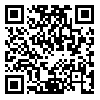Volume 7, Issue 1 (2016)
LRR 2016, 7(1): 39-57 |
Back to browse issues page
Download citation:
BibTeX | RIS | EndNote | Medlars | ProCite | Reference Manager | RefWorks
Send citation to:



BibTeX | RIS | EndNote | Medlars | ProCite | Reference Manager | RefWorks
Send citation to:
Dastamooz S, Mohammadi M. Checking the impact of indirect speech acts with interrogative constructions on the course of dialogue from the perspective of the Russian language. LRR 2016; 7 (1) :39-57
URL: http://lrr.modares.ac.ir/article-14-5596-en.html
URL: http://lrr.modares.ac.ir/article-14-5596-en.html
1- Assistant Professor in Department of Russian, Alzahra University, Tehran, Iran
2- Associate Professor of Russian, Tarbiat Modares University, Tehran, Iran
2- Associate Professor of Russian, Tarbiat Modares University, Tehran, Iran
Abstract: (9774 Views)
This study explained the impact of indirect speech acts with interrogative constructions on the course of dialogue from the perspective of the Russian language. Successful dialogue requires matching the intentions of communicants, that each of them has made its communicative purpose. Meanwhile addressee's statements are related speech acts, located entirely under the influence of the speaker's remarks. But sometimes, in the structure of the dialogue text are used constructions having a special purpose - to carry out the impact on the course of the dialogue. Interrogative sentences are actively used as a response cues in the dialogue, in this case they are indirect speech acts, since they were not used in their intended purpose - to ask a question. But are these proposals affect the course of the dialogue, or serve as a signal of communication failure? In this study indirect speech acts that have interrogative constructions assembled from National Corpus of Russian language and literature are analyzed in the course of the dialogue. In this research, which has functional descriptive approach, as a tool for discourse analysis was used the theory of Speech acts. The results of this study can be used to translate of indirect speech acts from Russian into Persian and vice versa.
Keywords: Dialogue, indirect speech act with interrogative construction, communication failure, changing the course of the dialogue, Russian language
| Rights and permissions | |
 |
This work is licensed under a Creative Commons Attribution-NonCommercial 4.0 International License. |






